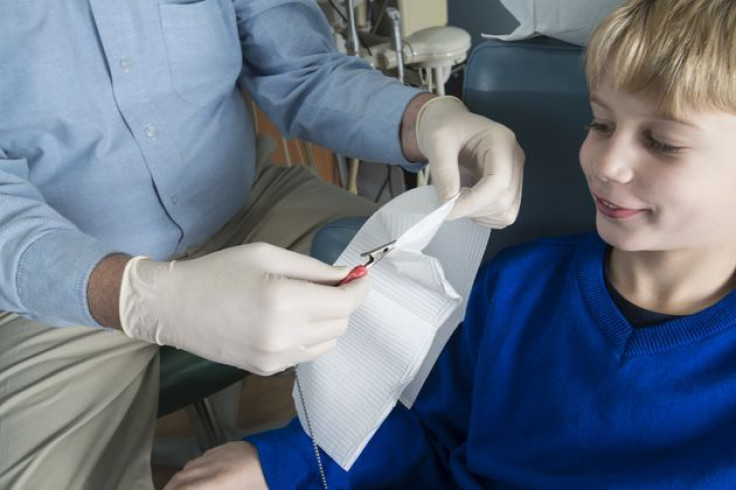Dental Bib Clips Retain Oral Bacteria After Disinfection

An unnerving new study finds that dental bib clips can retain potentially contagious gum disease-causing oral bacteria from previous patients, even after standard disinfection procedures.
Dental bib clips are generally considered safe to reuse from patient to patient, as long as they are disinfected with alcohol wipes according to standard protocol. This study calls the thoroughness of standard disinfection procedures into question.
Researchers from the Tufts University School of Dental Medicine and the Forsyth Institute found that, even though the vast majority of the thousands of bacteria found on bib clips after dental treatment were wiped out by standard disinfection, at least one type of oral bacteria remained on 70 percent of the bib clips.
The researchers tested the reusable rubber-faced metal clips on 20 dental bib holders for bacterial contaminants after patients at the Tufts dental hygiene clinic had used them, both immediately after use and again after standard disinfection. Using standard molecular identification techniques, as well as a new microbial analysis method developed by the Forsyth Institute, the team tested the bib clips for 300 of the most common oral bacteria.
The results showed that before disinfection, oral bacteria associated with periodontitis gum disease were found on 65 percent of the dental bib clips. After disinfection, 15 percent of the bib clips still had Streptococcus bacteria, and 5 percent had at least one species of Staphylococcus, Prevotella, or Neisseria bacteria.
Overall, 40 percent of the dental bib clips tested after disinfection retained one or more aerobic bacteria, which survive in the presence of oxygen. 70 percent of the bib clips tested after disinfection retained one or more anaerobic bacteria, which do not need oxygen to survive.
The oral bacteria most likely landed on the bib clips from patients' spattered saliva during dental treatment, from the gloved hands of dentists before or during treatment, or from the patients' hands during treatment.
Dr. Addy Alt-Holland, Assistant Professor at the Tufts University School of Dental Medicine and the lead researcher on the study, concluded in a statement that even after standard disinfection protocol, certain aerobic and anaerobic bacteria can survive on bib clips.
The team found no evidence of bacterial transmission to patients from the dental bib clips, and saw no immediate cause for alarm. Still, the researchers warn that there is a real risk of bacterial cross-contamination among patients.
"The previous patient's oral bacteria could potentially still be on the clip, and the new patient has a chance of being exposed to infection by using that same bib clip," added study coauthor Dr. Bruce Paster, Chair of the Department of Microbiology at the Forsyth Institute, in the statement. While such bacterial transmission is unlikely to harm most people, it's possible that common oral bacteria can become "opportunistic pathogens" in patients or clinicians with weak immune systems.
The researchers suggest in their paper that future studies on dental bib clips might explore "both the presence and composition of bacterial contamination" among different dental hygiene clinics, in an effort to compare the risk of cross-contamination among different specialties.
So what can dentists do to protect patients from bacterial cross-contamination?
Paster suggested that dental hygiene clinics switch to disposable bib clips, or use even more thorough sterilization methods than disinfecting wipes. It's possible that exposing dental bib clips to disinfectant for more time can ensure that all bacteria are eliminated.
For patients, the Tufts team recommends the following tips to avoid bacterial cross-contamination from dental bib clips:
- Request a disposable, one-time-use bib holder from your dentist
- If a disposable bib clip isn't available, ask the clinician to fully sterilize the rubber or metal bib holder
- Don't touch the dental bib clips
- Always make sure the clinician puts on fresh gloves before beginning treatment in your mouth. If the clinician touches anything else in the room with his/her gloves- the bib clip, the computer, his or her face- you have the right to ask them to change their gloves.
- Don't close your mouth around the suction used during cleaning and procedures. Instead, ask the dental clinician to do the suctioning during the procedure. Although the nozzle at the end of the suction tube is disposable and replaced between patients, the tube is typically only cleaned once per day. Closing your mouth around the suction can cause backwash from the tube to enter your mouth, introducing bacteria from other patients' saliva, blood and oral substances.
- All dental instruments used on a patient should be sterile. Make sure you see the dental hygienist open a fresh sterilization pouch of instruments, and if you don't see it opened in front of you, ask how the instruments were sterilized.
- Make sure you see dental professionals wearing gloves, coveralls, glasses and a mask during all procedures. If you notice something is missing, give the dentist or hygienist a friendly reminder.
- Thoroughly wash your hands with soap and water or antibacterial hand sanitizer before leaving the dentist's office.
The full study, published with the April issue of Compendium of Continuing Education in Dentistry, is available for free download at DentalBibClipBacteria.com.



























